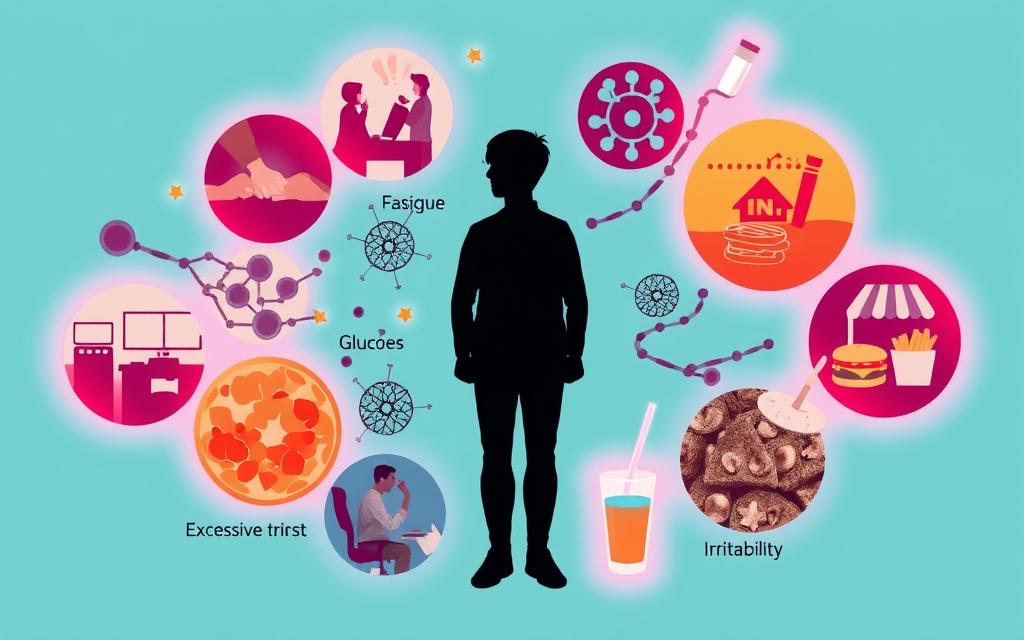Stress is a part of our lives, coming and going with a force that can feel too much. It impacts not just our minds but also our bodies, which is a big concern for people with diabetes. When we’re under stress, our blood sugar levels can spike. This is because stress hormones like cortisol and adrenaline make our bodies less responsive to insulin1.
This can lead to higher blood sugar levels. Feeling stressed can also increase our risk of diabetes complications. So, managing stress is key to keeping our health in check.
Key Takeaways
- Understanding the relationship between stress and blood sugar is vital for effective diabetes management.
- Stress-induced insulin resistance can lead to complications, particular for individuals with type 2 diabetes.
- Recognizing the symptoms of stress-related blood sugar fluctuations empowers us in managing our health.
- Incorporating stress management strategies can significantly assist in stabilizing blood sugar levels.
- Support from healthcare teams and community resources is crucial for those coping with diabetes-related stress.
Understanding Stress and Its Physiological Impact
Stress is a complex human reaction to tough situations. The body’s stress response is mainly controlled by the neuroendocrine system. This system triggers hormonal activities that can greatly affect our health, notably for those with diabetes stress.
Both short-term and long-term stress have different effects on our bodies. For instance, people with diabetes often feel more anxious, which can harm their metabolic function2.
Emotional stress makes it hard for people with diabetes to take care of themselves. Chronic stress can cause blood sugar levels to swing, thanks to hormones like adrenaline3. It’s important to understand these links, as studies show that people with diabetes are more likely to feel depressed2.
Even fewer people with diabetes who are depressed get help2. This is a big problem.
Stress can have serious long-term effects. It can make insulin resistance worse, making it harder to control blood sugar2. Almost one-third to half of people with diabetes struggle with stress related to their condition4.
Without ways to manage stress, like mindfulness or exercise, its effects can get worse. This can harm our overall health.
How Stress Influences Blood Sugar Levels
Stress can really affect our blood sugar levels. When we’re stressed, our body releases hormones like cortisol and adrenaline. These hormones can make our blood sugar go up. This makes managing diabetes harder and can lead to more hyperglycemia, as our body thinks it needs more energy5.
Dealing with daily stress can lead to unhealthy habits like eating too much or choosing bad foods. These habits can make it harder for our blood sugar to stay stable. But, studies show that managing stress well can lower blood sugar by 10-20%6.
It’s key to know that long-term stress, like what we face with diabetes, affects our blood sugar more than other stresses. Chronic stress and feeling overwhelmed can make it harder to keep our diabetes in check7. This can make us feel lonely or anxious, which can make our diabetes symptoms worse over time.
Also, not getting enough sleep and hormonal changes can make stress’s impact on blood sugar worse. To manage stress and diabetes, doing regular physical activity is helpful. It not only reduces stress but also lowers anxiety5. Let’s focus on finding ways to deal with stress and blood sugar together for better health.
The Role of Hormones in Stress-Induced Blood Sugar Changes
When we’re stressed, our body releases glucocorticoids and catecholamines. These hormones help control blood sugar levels. They make sure we have enough glucose for our body’s needs.
Glucocorticoids tell the liver to make more glucose. At the same time, they stop other parts of the body from using glucose. This can lead to high blood sugar levels8 and insulin resistance9.
People under constant stress may see their metabolic health suffer more. High blood sugar, or hyperglycemia, can happen when levels go over 180 mg/dl10. This is common in critically ill patients, with over 50% showing high blood sugar soon after being in the ICU8.
High stress hormones not only raise glucose levels but also cause long-term health issues.
Chronic Stress and Its Effects on Metabolic Function
Chronic stress can harm our metabolic health, causing insulin resistance and obesity. Studies show that long-term stress increases the risk of diseases like Type-2 diabetes and heart disease11. It makes us crave high-calorie foods, leading to metabolic problems11. Work stress can make this worse, leading to more obesity11.
Stress can deeply affect our health. People who faced stress as kids are more likely to get metabolic diseases12. Adults under stress may face a higher risk of obesity, diabetes, and liver disease12. Long-term stress can also make diseases worse, leading to more health problems12.
| Findings | Implications |
|---|---|
| Chronic stress is linked to T2DM and CVD. | Increases the urgency for stress management strategies. |
| Stress alters feeding behaviors. | Promotes obesity and metabolic dysfunction. |
| Individuals with childhood adversity face a higher risk of metabolic diseases. | Highlights the need for early interventions. |
| Long-term stress increases the risk of obesity and diabetes. | Focus on therapeutic benefits of stress management can improve outcomes. |

Stress and Diabetes: What We Need to Know
It’s important to understand how stress affects diabetes. This is true for both type 1 and type 2 diabetes. Each type has its own challenges that stress can make worse.
Type 1 Diabetes and Stress Response
People with type 1 diabetes face unpredictable blood sugar changes due to stress. Some may see their blood sugar go up, while others may see it go down13. When they get sick, their blood sugar often goes up, making it crucial to keep an eye on it14.
Staying healthy and following wellness routines can help keep blood sugar stable.
Type 2 Diabetes and Stress: A Vicious Cycle
For those with type 2 diabetes, stress makes insulin resistance worse, creating a cycle. Stress can make blood sugar levels go up in about 50-75% of people13. It’s also a risk factor for getting type 2 diabetes, affecting older women and men14.
Stress can lead to bad habits, making diabetes complications like high blood pressure and heart disease worse13.
Symptoms of Elevated Blood Sugar Due to Stress
Stress can make our blood sugar levels go up, leading to diabetes symptoms we should know. We start to see these signs when our blood sugar hits 180 to 200 mg/dL (10 to 11.1 mmol/L)15. Signs include feeling very thirsty, needing to pee a lot, and feeling really tired. These symptoms can creep up over days or weeks15.
People with diabetes need to watch out closely. If their blood sugar stays above 240 mg/dL (13.3 mmol/L) and they have ketones in their urine, they need to get help right away15.
Our feelings can really affect our health. Stress can make our blood sugar go up because of hormone changes. This can make us feel angry or sad, and it can mess with our mood and life quality16. Stress can also make our body release cortisol, which raises blood sugar levels17.
It’s important to understand how stress and diabetes symptoms are connected. Knowing how our body reacts to stress can help prevent big problems like heart issues or infections15. So, it’s key to check our blood sugar often when we’re stressed15.

| Blood Sugar Level (mg/dL) | Potential Symptoms | Recommended Action |
|---|---|---|
| Below 180 | None or mild symptoms | Regular monitoring |
| 180 – 200 | Increased thirst, frequent urination | Stay hydrated, check levels frequently |
| 200 – 240 | Fatigue, blurred vision | Seek advice from a health professional |
| Over 240 | Severe fatigue, confusion, potential ketones present | Immediate medical attention required |
Managing Stress and Diabetes: Practical Strategies
Managing stress is key for those with diabetes. Physical activity and relaxation techniques are great tools. They help balance and improve overall health.
Exercise as a Stress Relief and Blood Sugar Stabilizer
Regular exercise brings many health benefits. It’s a big stress reliever and helps keep blood sugar stable. Studies show moderate exercise can lower blood pressure by 5-10 mmHg18.
People who exercise regularly have a 30-60% lower risk of getting type 2 diabetes18. But, stress can make it hard to keep up with exercise19. So, finding fun exercises is crucial to stay consistent.
Mindfulness and Relaxation Techniques
Mindfulness and relaxation are vital for stress management. Studies show mindfulness can lower cortisol levels by up to 30%18. Techniques like meditation or progressive muscle relaxation can reduce anxiety and help relax.
A study found that people with type 2 diabetes who practiced progressive muscle relaxation saw blood sugar drops after 12 weeks19. About 60% of people who meditate say it greatly reduces stress19. These methods boost emotional health and aid in diabetes management.
The Importance of a Balanced Diet in Stress Management
A balanced diet is key for managing diabetes and stress. It helps our body control blood sugar levels, which is vital during stressful times. For example, chronic stress can make us crave unhealthy foods, leading to weight gain and obesity20 and21.
Choosing whole fruits over juices is important. It boosts fiber intake and keeps blood sugar stable. This is crucial for a diabetes diet.
Eating foods rich in omega-3 fatty acids, like fish, is also beneficial. Adding nonstarchy vegetables and lean proteins to our meals supports our metabolism21. Regular meal times help our body use insulin better and reduce stress eating20.
By making smart food choices, we can better manage stress and improve our health.

Professional Support: When to Seek Help
It’s crucial to know when we need professional help with stress and diabetes. About 70% of people with diabetes feel overwhelmed by managing their condition every day22. Getting professional help can give us personalized ways to handle stress and diabetes, helping us cope better.
There are signs that tell us it’s time to ask for help. Feeling really stressed or burnt out is a big one. A study found that 25% of adults with diabetes struggle with depression, making it hard to manage their blood sugar22. This shows how important it is to seek help when stress gets too much.
Also, getting the right diabetes education is key. Sadly, about 50% of people with diabetes don’t have access to it, which is vital for better health22. Working with certified diabetes experts can really help, like lowering hemoglobin A1c levels by 1-2%22.
There are also special programs for diabetes care that can help a lot. The ADA’s DSMES programs help us learn and feel more confident in managing our diabetes23. For emotional support, there’s a free program on healthy eating and exercise23.
We can use tools like the Diabetes Support Plan to find local help23. There are over 170 free materials to help us manage diabetes better23. Working with a registered dietitian can even save us money, showing how important professional help is22.
In short, getting professional help is crucial when dealing with diabetes and stress. Knowing when to ask for help can lead to better diabetes management and emotional health.
| Sign | Description |
|---|---|
| Feeling Overwhelmed | 70% of individuals with diabetes feel this way22. |
| Emotional Distress | 25% of adults with diabetes experience significant levels of depression22. |
| Lack of Education | 50% of people with diabetes lack access to comprehensive education22. |
| A1c Improvement | Working with specialists can lead to a 1-2% reduction in A1c22. |
Community and Online Resources for Stress Management
Managing diabetes well shows us how important community and online resources are. These platforms offer support groups where we can meet others with similar issues. We can share tips and feel like we belong.

The National Diabetes Prevention Program (NDPP) is a great example. It has CDC-recognized programs in over 500 places. People go to 16 weekly sessions and then meet up less often24.
Diabetes self-management education and support (DSMES) programs are open to all. They teach us about healthy eating and exercise25.
DiabetesSisters is great for women, offering a safe space to talk about stress. It helps us build a support network and learn to manage diabetes better. Mindfulness practices like deep breathing and meditation are also taught, helping us reduce stress and control blood sugar.
Technology helps us track our health better. Tools for changing behavior are getting more common. But, we need more research to know if they really work24.
By joining our local and online diabetes community, we learn a lot. We share our experiences and help each other deal with stress and diabetes.
Conclusion
The link between stress and blood sugar levels is key for managing diabetes. We must see how stress can harm our blood sugar control. By using good stress relief methods, we can improve our health and well-being, which is very important for diabetes management.
This mix of stress and diabetes needs a full plan. It includes changing our diet, being active, and working with doctors262728.
Also, the role of community and professional support is huge. Knowing about our health conditions helps us make better choices. Using resources like the American Diabetes Association can really improve our life quality262728.
By managing stress well, we can better handle diabetes and improve our overall health. Let’s work together for a healthier lifestyle that boosts both our physical and mental health.
FAQ
How does stress impact blood sugar levels in people with diabetes?
Stress can raise blood sugar levels by releasing hormones like cortisol and adrenaline. These hormones can make it harder for insulin to work. This can make managing diabetes harder and lead to high blood sugar.
What are some common symptoms of elevated blood sugar due to stress?
Signs of high blood sugar include feeling very thirsty, needing to pee a lot, feeling tired, and blurry vision. Spotting these signs early is key to managing diabetes well.
What strategies can we implement to manage stress related to diabetes?
To manage stress, try regular exercise, meditation, and eating foods that are good for you. These steps can help keep blood sugar stable and reduce stress.
When should we consider seeking professional help for stress management?
If stress is too much and affects your diabetes care or health, get help. Look for signs like constant worry, trouble sleeping, or hard time controlling blood sugar.
How can a balanced diet help in managing both stress and diabetes?
Eating well helps control blood sugar and gives energy for daily stress. Foods that keep energy steady can help manage stress and improve diabetes care.
Are there online resources or communities that support stress management for those with diabetes?
Yes, many online places and groups help with diabetes stress. They let you connect with others, share tips, and feel part of a community.
Source Links
- Stress and diabetes – https://www.diabetes.org.uk/living-with-diabetes/emotional-wellbeing/stress
- The Connection Between Stress and Diabetes – https://health.umms.org/2024/09/20/connection-between-stress-and-diabetes/
- Stress, Depression and Diabetes: What To Know – https://health.clevelandclinic.org/stress-and-diabetes
- Diabetes and Mental Health – https://www.cdc.gov/diabetes/living-with/mental-health.html
- PDF – https://www.maine.gov/mdot/challengeme/topics/docs/EmotionsStress.pdf
- How stress affects blood glucose levels – https://www.allinahealth.org/health-conditions-and-treatments/health-library/patient-education/gestational-diabetes/healthy-eating-physical-activity-stress-management/how-stress-affects-blood-glucose-levels
- How Stress Affects Your Blood Sugar – https://www.dexcom.com/en-ca/blog/how-stress-affects-blood-sugar
- Stress-Induced Hyperglycemia: Consequences and Management – https://pmc.ncbi.nlm.nih.gov/articles/PMC9360912/
- Researchers Suggest Stress Hormones Explain How Obesity Causes Diabetes – https://rutgershealth.org/news/researchers-suggest-stress-hormones-explain-how-obesity-causes-diabetes
- Stress hyperglycemia: Why does stress raise blood sugar levels? – https://www.medicalnewstoday.com/articles/stress-hyperglycemia
- Stress and Metabolic Disease – Sociality, Hierarchy, Health: Comparative Biodemography – https://www.ncbi.nlm.nih.gov/books/NBK242443/
- The multiple roles of life stress in metabolic disorders – Nature Reviews Endocrinology – https://www.nature.com/articles/s41574-022-00746-8
- Helping Patients with Diabetes Manage Stress – Blog – NIDDK – https://www.niddk.nih.gov/health-information/professionals/diabetes-discoveries-practice/helping-patients-with-diabetes-manage-stress
- Stress is affecting your type 2 diabetes – https://intermountainhealthcare.org/blogs/stress-is-affecting-your-type-2-diabetes
- Hyperglycemia in diabetes-Hyperglycemia in diabetes – Symptoms & causes – Mayo Clinic – https://www.mayoclinic.org/diseases-conditions/hyperglycemia/symptoms-causes/syc-20373631
- Is Your Mood Disorder a Symptom of Unstable Blood Sugar? – The Pursuit – U-M School of Public Health – https://sph.umich.edu/pursuit/2019posts/mood-blood-sugar-kujawski.html
- Hyperglycemia – https://my.clevelandclinic.org/health/diseases/9815-hyperglycemia-high-blood-sugar
- Managing Stress When You Have Diabetes – https://www.webmd.com/diabetes/managing-stress
- 6 Ways to Reduce Stress With Diabetes – https://www.everydayhealth.com/hs/type-2-diabetes-management/reduce-stress/
- Stress and Health – https://nutritionsource.hsph.harvard.edu/stress-and-health/
- Diabetes diet: Create your healthy-eating plan – https://www.mayoclinic.org/diseases-conditions/diabetes/in-depth/diabetes-diet/art-20044295
- Your Health Care Team| ADA – https://diabetes.org/health-wellness/diabetes-and-your-health/your-healthcare-team
- Diabetes Support Resources | American Diabetes Association – https://professional.diabetes.org/diabetes-support-resources
- Support Your Patients with Resources & Referrals – NIDDK – https://www.niddk.nih.gov/health-information/professionals/clinical-tools-patient-management/diabetes/game-plan-preventing-type-2-diabetes/help-patients-make-lifestyle-changes-after-prediabetes-diagnosis/support-your-patients-with-resources-referrals
- Living with Diabetes – https://www.cdc.gov/diabetes/living-with/index.html
- Summary and Conclusion – A Practical Guide to Diabetes-Related Eye Care – https://www.ncbi.nlm.nih.gov/books/NBK582430/
- The prevention and control the type-2 diabetes by changing lifestyle and dietary pattern – https://pmc.ncbi.nlm.nih.gov/articles/PMC3977406/
- Diabetes awareness – East Basildon Primary Care Network – https://www.eastbasildonpcn.nhs.uk/news/diabetes-awareness/
